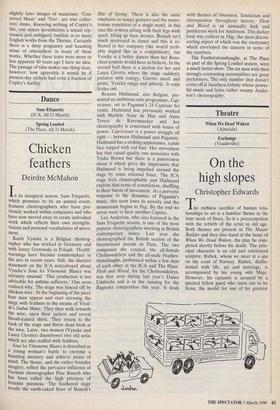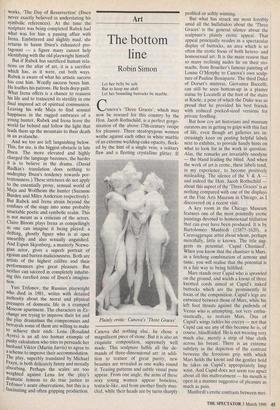Theatre
When We Dead Waken (Almeida) Exchange (Vaudeville)
On the high slopes
Christopher Edwards
he ruthless sacrifice of human rela- tionships to art is a familiar theme in the later work of Ibsen. So is a preoccupation with the rebirth of the artist in old age. Both themes are present in The Master Builder and they also stand at the heart of When We Dead Waken, the play he com- pleted shortly before his death. The prin- cipal character is an old and celebrated sculptor, Rubek, whom we meet at a spa on the coast of Norway. Rubek, disillu- sioned with life, art and marriage, is accompanied by his young wife Maja. However, his curiosity is aroused by a spectral fellow guest who turns out to be Irena, the model for one of his greatest
works, 'The Day of Resurrection' (Ibsen never exactly believed in understating his symbolic references). At the time the sculpture was being completed Rubek had what was for him a passing affair with Irena. Embittered and slightly mad, she returns to haunt Ibsen's exhausted pro- tagonist — a figure many cannot help identifying with the old playwright himself.
But if Rubek has sacrificed human rela- tions on the altar of art, it is a sacrifice which has, as it were, cut both ways. Rubek is aware of what his artistic success has cost him. Wordly success bores him. He loathes his patrons. He feels deep guilt. What Irena offers is a chance to reassess his life and to transcend its sterility in one final inspired act of spiritual communion. Leaving his wife Maja to find sensual happiness in the rugged embraces of a Young hunter, Rubek and Irena leave the world far behind and follow the light that leads them up the mountain to their death in an avalanche.
And we too are left languishing below. This, for me, is the biggest obstacle in late Ibsen. The more elevated and highly charged the language becomes, the harder it is to believe in the drama. (David Rudkin's translation does nothing to underplay Ibsen's tendency towards por- tentousness.) These strictures do not apply to the essentially prosy, sensual world of Maja and Wolfheirn the hunter (Suzanne Burden and Miles Anderson respectively). But Rubek and Irena strain beyond the confines of the stage into some probably unactable poetic and symbolic realm. This Is not meant as a criticism of the actors. Claire Bloom plays Irena as compellingly as one can imagine it being played: a drifting, ghostly figure who is at once unearthly and also sexually anguished. And Espen Skjonberg, a masterly Norwe- gian actor, gives a superb portrait of egoism and barren maliciousness. Both are artists of the highest calibre and their Performances give great pleasure. But neither can succeed in completely inhabit- ing this rarefied zone of Ibsen's imagina- tion.
Yuri Trifonov, the Russian playwright Who died in 1981, writes with detailed authority about the moral and physical pressures of domestic life in a cramped Moscow apartment. The characters in Ex- change are trying to improve their lot and the play dramatises the compromises and betrayals some of them are willing to make to achieve their ends. Lena (Rosalind Ayres) is an all too human example of Pushy calculation who tries to persuade her husband Viktor (Martin Jarvis) to agree to a scheme to improve their accommodation. The play, superbly translated by Michael Frayn, is both delicately funny and morally absorbing. Perhaps the scales are too weighted against Lena for the play's dramatic tension to do true justice to Trifonov's acute observations, but this is a fascinating and often gripping production.



























































 Previous page
Previous page